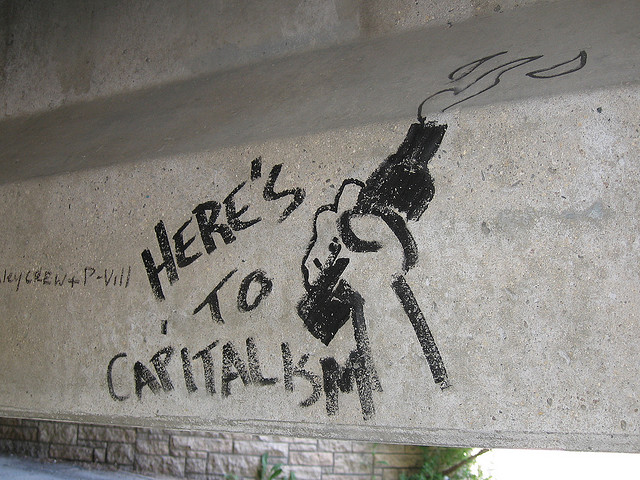|
|||||||||||||
Capitalism is Opposed to Human Happiness Debate, Volume 2
Posts #011-#015
Post #011
What Happened to my post? Here it is again: To Andy Carloff / aka CNT-FAI Radical: I love your posts, except for their length (I guess I'm not an avid reader/scholar). I agree that uneven negotiating power of participants is a problem, in that it results in distributions which are not based on productivity or birth right and are not inherently fair. I also think that if everyone owned a reasonable share of the means of production, the uneven negotiating power would be ameliorated, in that even if a worker does not receive his proper wage, at least he would benefit from sharing in the resulting dividends. Of course, that all depends on the actual numbers, not whether they are wages or dividends. However, I believe workers would do better to negotiate for more dividends, for a bigger share of real income, then for more wages, which might not be supportable in a given economy. The terms "socialism" (and also "capitalism", for that matter) is really too broad to actually describe any real solution or economic system. For example, is the following solution socialist or capitalist: There's no government as we know it. Instead, there is a private land-owning corporation, owned by its share holders. As any landlord in a capitalist economy, the corporation derives its income by collecting rent. As any landlord in a capitalist economy, they can decide who to allow on their land, and under what conditions, and they can employ a security service to guard and police their property, and even physically remove a trespasser. And they can institute rules that apply to occupants of the land. However, unlike most or all such corporations today, this corporation has the following rules regarding share holding: 1. Only real persons can become share holders. 2. Any real person who comes of age (say 20) on this land is issued a predetermined minimal number of shares. And 3. There's a maximum on the number of shares each person can own. Depending on the a.m. minimum and maximum shares, is this socialist, or a variation on typical capitalist corporations? Or both... Regardless of the label, could this be the framework for a solution that would address your concerns? Post #012
Quote: In the end its just a redistribution of wealth, no matter how you call it. Every person with a saving account is a shareholder. And no sane person on this planet would deny that redistribution is necessary to some extent. Post #013
Quote: Rugoz wrote: Exactly. But the point here is that this can arguably be done or implemented within a so-called "capitalist" frame-work, so I don't think capitalism per-se is "Opposed to Human Happiness". And also, using these broad labels of "Capitalism" and "Socialism" can be misleading. Post #014
Quote: Hmm. If you look at history you see capitalism has done far more of the opposite. In N Korea where there is no capitalism you have people starving to death and having anesthesia free amputations. Yikes! Cuba is a slum. Russia went bankrupt. Free market systems have never had famines where it killed millions like controlled markets have. Then you have the fantastic growth in China thanks to allowing more capitalism. The breakdown of racial barriers with the advancement of freer trade. The list goes on. Sounds like capitalism does more than any other system we know to date! Post #015
CNT-FAI Radical: The aspect your original post concentrated on was "inequality of bargaining power between the Capitalist and the laborer". It's not clear how you understand the term "bargaining power", but yes, something undesirable like that may indeed happen, it generally will appear in the context of a monopoly, or oligopoly, rather than a competitive market (and you seem to understand the concept similarly, because you say "majority of these tools are possessed by a very few"). Your solution - socialism, at least one standard implementation of it - is to create one big national "corporation" and make every citizen a "shareholder". But now you have an actual monopoly and that makes the "bargaining power" problem only worse. You seem to think that making the decision process democratic (or however it happens in your version of socialism) makes the problem disappear - no, it makes it worse, since you now have an unbreakable monopoly. There is only one employer to choose from, so a worker has very little bargaining power. He can't switch to a competitor. Whether the worker also happens to be a shareholder doesn't matter. I'm also a shareholder of my employer, that doesn't give me any special treatment regarding my employment. Employment is based on business efficiency, not on who's a shareholder and who isn't. I rely on competition between employers. You're hoping that by making ownership public and putting everybody on equal footing, you solve the problem. No, you create a situation where basically everybody exploits everybody and everybody ends up poor, since labor is globally mis-priced and mis-allocated, since there is no competition at all. If you believe the labor market in a given country is not competitive enough, you should be going the opposite way - making sure it is more competitive. Open international borders for employers, reduce restrictions for people starting new businesses, etc.
|



